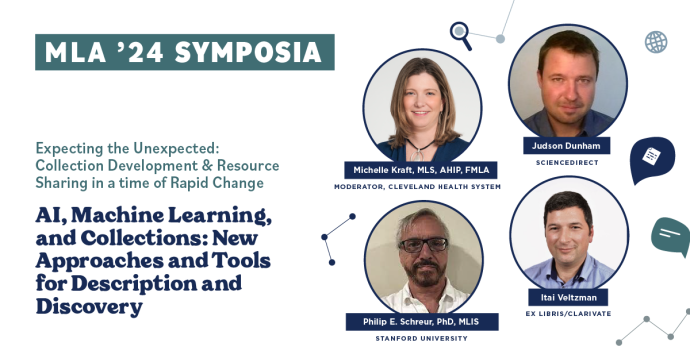Expecting the Unexpected: Collection Development and Resource Sharing in a Time of Rapid Change Symposium
In the weeks leading up to MLA ’24 in Portland, we’re profiling the experts leading each of the symposium sessions by sharing their answers to questions about themselves and their session. We continue the series with the moderator and presenters of AI, Machine Learning, and Collections: New Approaches and Tools for Description and Discovery, Judson Dunham (JD), Michelle Kraft (MK), Philip E. Schreur (PS), and Itai Veltzman (IV).
Join them for their session on Tuesday, May 21, 2024, 1:30-2:45 p.m., pacific time. The session will be streamed live. To learn about all the Symposium sessions and their presenters, please see the Symposium Session Schedule.
What are you most looking forward to seeing/eating/experiencing in Portland?
IV: I will be more than happy to try some Pacific Northwest Fish, and, as a sea lover and especially a lover of lighthouses, I will be happy to have an opportunity to see Casco Bay.
JD: I actually have no idea and am looking forward to figuring that out! I loved Portlandia and assume there’s some kind of truth to its hilarious caricatures. I’m interested in seeking that out and just generally experiencing the weird side of Portland.
MK: I love food and drink, so I am looking forward to experiencing the local brewpubs and maybe going on a brewery tour or even a haunted pub tour.
PS: I've been to Portland a number of times but have never managed to make it to Voodoo Doughnuts! It's right up there with my favorite tiki bar, Hale Pele.
What’s a fun or surprising fact about AI, machine learning, and collections?
IV: IMDB recommended 43 AI and Robot movies from the last 20 years (43 Best AI and Robot Movies_(Updated_2024) - IMDb), and I’ve seen more than half of them. It is very interesting to see the gap between our reality today and the promise of AI in these movies.
JD: For most people my age, the first interaction with what could reasonably be called AI was probably with video games. Even ancient systems like the Atari had games with an ability to match and often exceed real-time player actions in complex adversarial situations like combat or chases. I think it’s a fun idea to remind us that with all tech, we are maybe amazed for a day or two, then it’s commonplace, and we never think of it again.
MK: People are using AI more than they realize. 85% of Americans use at least one product with AI. For example: navigation apps, video and streaming services, smartphone apps, ride-sharing apps, intelligent home personal assistants, like Alexa or Google Home, smart home devices, like thermostats and lighting. AI has been here for a while and the Terminator hasn’t come to get us. . .yet.
PS: Back in 2000-2005, I was in a position at HighWire Press in which I used AI to create automated subject analyses of STEM journals. BMJ (British Medical Journals) liked the AI analysis better than the human analysis! They said both humans and machines made mistakes, but the machines made predictable mistakes.
How did you get started in your field?
IV (software): I can answer a different question: Why am I so passionate about data? For more than 25 years, I've been creating complex information systems. I’m always looking for new ways of creating the model that expresses the world around us in the most accurate way. I started with a human resource planning system, learned a lot on energy trading compliance, and in the last 6 years, I’m learning everything I can about metadata.
JD (publishing): Just after graduating from college in 2001, I was working at the Ohio State University College of Nursing building bespoke course websites. An Elsevier journal editor on the faculty heard that the submission process was going to be transitioning to the web. Her desk editor was retiring, so she asked me if I wanted to take over, assuming it would be good to have a person around who understood the Internet. Scholarly publishing seemed like a useful pursuit so I took it. I left that job when I moved to the Netherlands a year later and purely by chance I got another job at Elsevier, where I have been ever since.
MK (librarianship): I originally was a physical therapy major and working in the campus library. I hated my major but enjoyed searching and finding things in the library. To me it was one big scavenger hunt. So I changed my major and then went to graduate school at the University of Missouri.
PS (librarianship): When I was a music graduate student at Stanford, I was sitting on the floor looking through the card catalog. The head of the library saw me and said, you're too skinny, you need to eat more. Would a job help? I think you need to work for the library. The rest is history.
What’s the main thing you want participants to take away from your session?
IV: The challenges in implementing AI and how AI can be a great new tool in your tool box. Also, the potential of using AI to create linked data and utilizing AI to get insights from the links.
JD: I would like people to share my excitement that this could be a once-in-a- generation-moment change and that we should all feel enormously privileged to be in a position to help shape it to maximally benefit humanity.
MK: Don’t be afraid. Learn, experiment, think of small ways that you can try and use AI to better understand working with it.
PS: This is such an exciting time! AI can help with 1001 tasks we're not staffed to support and give whole new approaches to discovery and access.




